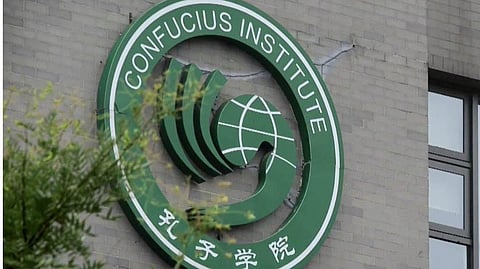The ministry of education’s reported move to review Confucius Institutes and Confucius Classrooms jointly established by China’s Confucius Institute and seven Indian universities and colleges has sparked off a controversy. This move appears to be a belated reaction, with the India-China standoff in east Ladkah becoming the trigger. However, when the world was reacting to this soft power strategy of China by proscribing the Confucius Institutes last year, India chose to turn a blind eye.
Days after Beijing asked New Delhi to “avoid politicisation” of cooperation in the higher education sector, including the Confucius Institutes, India made it clear that institutes which did not take approval from the government during their establishment will be under the scanner.
Anurag Srivastava, spokesman, ministry of external affairs said, “I would like to highlight that the ministry of external affairs had in 2009 issued detailed guidelines for establishment and functioning of Foreign Cultural Centres. These guidelines apply also to any cultural centre that is supported/sponsored by an autonomous foreign organisation, including any Confucius Centre.
Under these guidelines, approval of MEA is required for any MoU/Agreement that such Centres might wish to enter into with an Indian organisation. Naturally, if any Indian institution were to enter into or has entered into an arrangement which would come under the purview of these guidelines, then it would require the approval of the government.” In India, the seven institutions running CIs include OP Jindal University, Vellore Institute of Technology and Lovely Professional University.
Institute for propaganda
Confucius Institutes derive their name from the renowned Chinese educator and philosopher Confucius, who lived from 551 BCE to 479 BCE. China claims that Confucius Institutes serve as a “bridge reinforcing friendship” between it and the world. But critics maintain that the government-run body – which offers language and cultural programmes overseas – is used by Beijing to spread propaganda under the guise of teaching, interfere with free speech on campuses and even to spy on students. Last year, a number of universities around the world shut down programmes operated by the institute. In Australia, an investigation was ordered into whether agreements between universities and the institute have broken anti-foreign interference laws.
Open to the general public, Confucius Institutes promote Chinese language but also run classes in culture, from calligraphy and cooking to tai chi. They sponsor educational exchanges and hold public events and lectures.
The first CI opened in 2004 in South Korea, and according to official data, there were 548 Confucius Institutes around the world by the end of last year, as well as 1,193 Confucius classrooms based in primary and secondary schools. In India, the CIs get students from all sorts of backgrounds including the IT industry, business, college students and retirees. The students come to learn Chinese language in order to boost their professional skills.
The CIs are joint ventures between the host university or school, a partner university in China, and Hanban, a controversial agency under China’s education ministry. It oversees CI operations and provides partial funding, staff and other support. Backed by significant government funding, China aims to have 1,000 such institutes by 2020 in what it calls a “Confucius revolution” to tap into the growing overseas demand to learn Chinese.
The institutes have been accused of pressuring host universities to silence or censor talks on topics considered controversial by Beijing. For example, at a conference in Portugal in 2014, the head of Hanban, Xu Lin, told her staff to remove references to Taiwan from the conference programme before it was distributed to participants. According to reports, Indian intelligence agencies found that discussion on three Ts is taboo in the CIs operating in India – Tibet, Taiwan and Tiananmen.
China, on the other hand, argues that CIs are no different from the cultural centres operated by other countries, such as the British Council and Spain’s Cervantes Institute.
Australia seems to have borne the brunt of the controversy over CIs. In July last year, Australian media reported that local universities hosting CIs had signed agreements which gave China decision-making authority over teaching at the facilities. Then in late August, New South Wales announced it was scrapping programmes run by the CI in its schools altogether.

